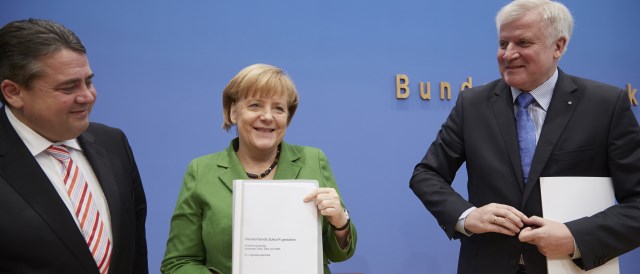In a few weeks, German Chancellor Angela Merkel could officially begin her next term in office now that the Christian Democrats and the Social Democrats have reached a coalition agreement. Craig Morris takes a look at the reactions to the new proposals, which Matthias Lang recently summed up here.

Won’t make the renewable sector rejoice: The Coalition Agreement. (Photo by CDU / Laurence Chaperon)
In name, the CDU/SPD coalition is the same one we had from 2005-2009. Nonetheless, German proponents of renewables seem to be taking this new coalition agreement to be as much of a setback as the CDU/FDP agreement from 2009.
You need not look far to see the reasons – the SPD is no longer the party of Hermann Scheer. One major new voice in the party is Hannelore Kraft, a very popular politician – and also someone wedded to the coal sector. Indeed, the situation is hardly better with other leading SPD politicians; in his TV debate against Angela Merkel during the election campaign, SPD chancellor candidate Peer Steinbrück also openly expressed his concern about the coal sector’s welfare.
Both parties have capable proponents of renewables, such as the SPD’s Ulrich Kelber. In a recent interview with Deutsche Welle (in German), however, he openly accused Angela Merkel of intervening to slow down the energy transition during the coalition negotiations. At the same time, as I discuss here, the politicians seem to have confused energy and electricity in their final document. (Please also note the corrected error in Matthias Lang’s target range for 2035 in his article.)
The BDEW, which represents utilities, says it is “largely pleased” about the changes in the power sector. But the BEE, a lobby group representing all renewables, agrees that the new proposals slow down the transition. Furthermore, the BEE says that the government continues to focus on electricity and overlook transport (mobility) and heat. German environmental organization DNR also says the changes “slow down the growth of renewables, with environmentally damaging coal power now being considered indispensable.”
Solar lobby group BSW says it is “disappointed” by the changes, though the policy for PV remains the same; there will be a monthly reduction in feed-in tariffs for newly connected systems until 52 GW has been installed, and after that no feed-in tariffs will be offered any further. Apparently, politicians erroneously believe the market will stop at that point, but in fact solar is poised to continue growing. Germany currently has 35 GW of PV installed and is currently growing at 4 GW per year, so the 52 GW ceiling could be met in 2017.
What Germany actually needs is far more wind power (especially relative to solar), but the coalition aims to slow down the growth of wind power even more. The BWE, which represents owners of wind turbines, called the coalition negotiations “sobering” and points out that onshore wind power “stabilizes power prices.” Indeed, onshore wind power has always been the cheapest source of renewable electricity, a situation that will not change in the foreseeable future.
Germany’s leading economics research institute, DIW, was also quick to come out against plans to set up a capacity market (essentially, paying conventional plants to stay online when renewables offset their power production); in a new paper (in German), they clearly argue that “Germany does not need a capacity market.”
In conclusion, the new coalition looks bad for renewables. The tweaking of policies does not even go in the right direction – though we will have to come back to those details later. I close with a statement by Patrick Graichen of Berlin-based think tank Agora Energiewende, who points out that the details to all of these amendments have not yet been worked out and adds, “there is still lots of room for informing decision-makers.”
Craig Morris (@PPchef) is the lead author of German Energy Transition. He directs Petite Planète and writes every workday for Renewables International.